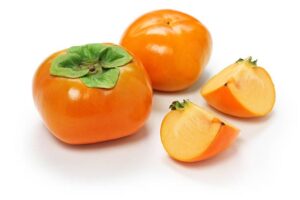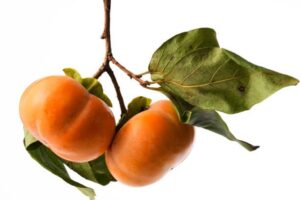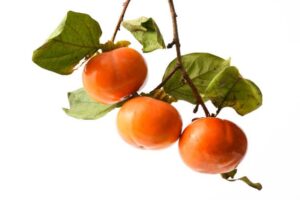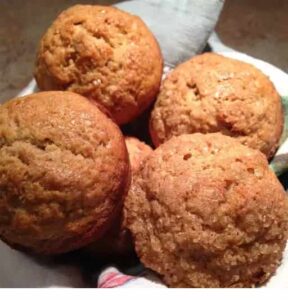Persimmons, commonly known as kaki in some regions, are a vibrant and delectable fruit that not only pleases the taste buds but also offers an array of health benefits. Scientific research has unveiled numerous advantages associated with the consumption of kaki, making it a valuable addition to a well-balanced diet. This article delves into the benefits of persimmons, exploring some of the scientifically-backed persimmons benefits.
Nutrient-Rich Powerhouse
Kaki is renowned for its rich nutrient profile. It is an excellent source of vitamins, particularly vitamin A, vitamin C, and vitamin E. A 100-gram serving of raw persimmon provides about 81% of the recommended daily intake of vitamin A, contributing to healthy vision and immune system function. Moreover, the vitamin C content in persimmons bolsters the body’s defense against infections and enhances collagen synthesis, vital for skin health. Vitamin E, an antioxidant, found in persimmons plays a role in protecting cells from oxidative damage.
Fiber for Digestive Health
Dietary fiber is an essential component of persimmons, with a 100-gram serving containing approximately 3.6 grams of fiber. Dietary fiber is associated with numerous health benefits, including improved digestive health. It promotes regular bowel movements, prevents constipation, and may reduce the risk of digestive disorders such as diverticulitis. Additionally, the fiber content aids in weight management by inducing a feeling of fullness, potentially assisting in weight loss efforts.
The unique combination of soluble and insoluble fiber in persimmons makes it a standout choice for maintaining a healthy digestive system. Soluble fiber helps regulate blood sugar levels and lower cholesterol, while insoluble fiber adds bulk to stools, easing their passage through the digestive tract. This dynamic duo of fibers in persimmons contributes to a well-balanced and efficient digestive function.
Antioxidant Properties
Persimmons are rich in antioxidants, such as carotenoids, flavonoids, and polyphenols. These compounds help combat oxidative stress in the body, which is linked to chronic diseases and aging. Studies have shown that regular consumption of foods high in antioxidants, like persimmons, may reduce the risk of chronic diseases, including heart disease and certain types of cancer.
Additionally, persimmons contain specific antioxidants like beta-carotene, quercetin, and tannins, which have been associated with improved eye health, reduced inflammation, and protection against harmful free radicals. These unique properties make persimmons a valuable addition to your diet, promoting overall well-being and longevity.
Cardiovascular Health
 Several scientific studies have suggested that consuming persimmons can have a positive impact on heart health. The fruit’s high potassium content can help regulate blood pressure, reducing the risk of hypertension and stroke. Additionally, the antioxidants and fiber in persimmons may contribute to lower cholesterol levels, further protecting cardiovascular health.
Several scientific studies have suggested that consuming persimmons can have a positive impact on heart health. The fruit’s high potassium content can help regulate blood pressure, reducing the risk of hypertension and stroke. Additionally, the antioxidants and fiber in persimmons may contribute to lower cholesterol levels, further protecting cardiovascular health.
Moreover, persimmons are a rich source of polyphenols, including catechins and tannins, which are known for their potential to improve blood vessel function and reduce inflammation, both essential factors in maintaining cardiovascular well-being. The combination of these compounds, along with vitamins like vitamin C and A, strengthens the heart’s defenses, making persimmons a heart-healthy addition to your diet.
Anti-Inflammatory Effects
Inflammation is at the root of many chronic diseases, including arthritis, diabetes, and cardiovascular disease. Research has indicated that the phytochemicals found in persimmons possess anti-inflammatory properties. These compounds may help reduce inflammation in the body, potentially lowering the risk of developing these chronic conditions.
Furthermore, persimmons are a rich source of specific antioxidants like tannins, which play a vital role in combating inflammation and oxidative stress. These unique compounds not only protect the body from chronic diseases but also contribute to the overall health and well-being by neutralizing harmful free radicals and supporting a balanced inflammatory response.
Supporting Blood Sugar Control
Persimmons have a low glycemic index (GI), which means they release sugar into the bloodstream slowly. This property makes them an excellent choice for individuals with diabetes or those aiming to manage blood sugar levels. Some studies have shown that regularly consuming low-GI foods like persimmons can improve glycemic control.
Persimmons owe their blood sugar benefits to their high fiber content, particularly soluble fiber. This fiber helps regulate glucose absorption and insulin sensitivity. Furthermore, the presence of natural antioxidants and polyphenols in persimmons may contribute to their role in supporting stable blood sugar levels.
Supporting Digestive Health
 One of the standout features of persimmons is their fiber content. A 100-gram serving provides around 3.6 grams of dietary fiber, contributing to a healthy digestive system. Fiber is crucial for maintaining regular bowel movements and preventing constipation. Additionally, it supports the growth of beneficial gut bacteria, which can have a positive impact on overall gut health.
One of the standout features of persimmons is their fiber content. A 100-gram serving provides around 3.6 grams of dietary fiber, contributing to a healthy digestive system. Fiber is crucial for maintaining regular bowel movements and preventing constipation. Additionally, it supports the growth of beneficial gut bacteria, which can have a positive impact on overall gut health.
Persimmons are also rich in tannins, which may aid in soothing digestive discomfort and reducing the risk of diarrhea. Furthermore, their natural enzymes can assist in breaking down food more efficiently, promoting better nutrient absorption and smoother digestion.
Enhanced Immune Function
The immune-boosting properties of persimmons, attributed primarily to their high vitamin C content, cannot be overstated. Vitamin C plays a pivotal role in bolstering the body’s defense mechanisms. It enhances the production of white blood cells, which are vital for fighting infections, and also acts as an antioxidant, reducing oxidative stress. Consuming persimmons, especially during cold and flu seasons, can fortify your immune system.
Furthermore, persimmons contain phytonutrients like beta-carotene, lutein, and zeaxanthin, which provide additional immune support and help protect against various illnesses. These compounds, along with vitamin C, create a powerful synergy that promotes overall health and resilience against infections.
Cancer Prevention Potential
Emerging research suggests that persimmons may have potential cancer-fighting properties. Some studies have indicated that the phytochemicals in persimmons, such as betulinic acid and quercetin, could inhibit the growth of cancer cells.
While more research is needed in this area, incorporating persimmons into a diet rich in fruits and vegetables is a prudent choice for cancer prevention. The unique combination of antioxidants and bioactive compounds in persimmons holds promise for the development of targeted cancer therapies and further exploration of their potential role in preventing this complex disease.
Skin Health and Anti-Aging

The vitamin E content in persimmons, combined with their antioxidant properties, can have positive effects on skin health. Antioxidants help protect the skin from damage caused by harmful UV rays and environmental pollutants. Additionally, vitamin E supports skin hydration and elasticity, potentially reducing the signs of aging.
Furthermore, persimmons contain compounds like beta-carotene and lycopene, which contribute to a radiant complexion and may aid in the prevention of skin issues. Their natural astringent properties can also assist in tightening and toning the skin, promoting a youthful and rejuvenated appearance.
Weight Management
The dietary fiber in persimmons not only aids digestion but also promotes a feeling of fullness. This can be particularly beneficial for those looking to manage their weight. By helping control appetite, persimmons can be a valuable addition to a weight loss or maintenance plan.
Persimmons’ weight management benefits are further enhanced by their low calorie and fat content, making them an ideal choice for those aiming to shed pounds. Additionally, the unique combination of vitamins and antioxidants in persimmons supports metabolism and assists the body in effectively utilizing stored energy.
How to Enjoy Persimmons
There are several ways to incorporate persimmons into your diet. They can be eaten fresh as a healthy snack or added to salads for a sweet and juicy twist. Dried persimmons are also a popular option and can be used as a natural sweetener in recipes. Additionally, you can blend persimmons into smoothies or use them in baking for a unique flavor.
 Indulge your taste buds in a delightful fusion of flavors with these Banana and Persimmon Cinnamon Muffins. This scrumptious recipe combines the sweet creaminess of ripe bananas with the unique, honey-like essence of persimmons, all beautifully infused with the warm embrace of cinnamon. Each bite offers a harmonious blend of moist, tender crumb and aromatic spices, making these muffins an irresistible treat for breakfast, brunch, or a satisfying snack.
Indulge your taste buds in a delightful fusion of flavors with these Banana and Persimmon Cinnamon Muffins. This scrumptious recipe combines the sweet creaminess of ripe bananas with the unique, honey-like essence of persimmons, all beautifully infused with the warm embrace of cinnamon. Each bite offers a harmonious blend of moist, tender crumb and aromatic spices, making these muffins an irresistible treat for breakfast, brunch, or a satisfying snack.
Nutritional Value of Persimmons (per 100 grams):
- Calories: Approximately 81 kcal
- Water: About 81 grams
- Protein: Around 0.81 grams
- Fat: Approximately 0.4 grams
- Carbohydrates: About 19 grams
- Dietary Fiber: Approximately 3.6 grams
- Sugars: Approximately 12.5 grams
- Vitamins:
- Vitamin A: About 81% of the recommended daily intake (RDI)
- Vitamin C: Approximately 33% of RDI
- Vitamin E: Approximately 1% of RDI
- Vitamin K: Approximately 2% of RDI
- Minerals:
- Potassium: Around 8% of RDI
- Calcium: Approximately 1% of RDI
- Iron: About 1% of RDI
- Magnesium: Approximately 2% of RDI
- Phosphorus: Around 1% of RDI
Note: Nutritional values may vary slightly depending on the ripeness and variety of persimmons.
Persimmons are not only low in calories but also provide essential nutrients like vitamins A and C, dietary fiber, and potassium. They are a healthy addition to your diet, offering a sweet and nutritious option for snacks or as part of various dishes.
Conclusion
Incorporating persimmons (kaki) into your diet can provide a wide array of health benefits, supported by scientific research. These benefits range from improved digestive health and cardiovascular support to antioxidant and anti-inflammatory effects. The fruit’s nutrient-rich profile, coupled with its delicious taste, makes it a valuable addition to a balanced diet. As always, it’s essential to enjoy persimmons as part of a diverse and balanced eating plan to reap the full spectrum of health advantages they offer.
So, the next time you encounter this vibrant fruit, consider indulging in its natural sweetness while knowing that you’re also nourishing your body with a multitude of health benefits, as supported by scientific evidence.
Contraindications for Consuming Persimmons (Kaki):
While persimmons are generally considered safe and nutritious for most people, there are a few contraindications and considerations to keep in mind:
Allergic Reactions:
Some individuals may be allergic to persimmons, experiencing symptoms such as itching, swelling, hives, or digestive discomfort. If you have a known fruit allergy or experience any adverse reactions after consuming persimmons, it’s advisable to avoid them.
Gastrointestinal Discomfort:
Persimmons contain tannins, which can cause astringency and a dry, puckering sensation in the mouth. Eating unripe persimmons with high tannin levels may lead to gastrointestinal discomfort, including nausea and constipation. It’s best to consume ripe persimmons, which have lower tannin levels and a sweeter taste.
Diabetes Management:
While persimmons have a low glycemic index and can be part of a diabetic diet, individuals with diabetes should monitor their blood sugar levels when incorporating persimmons into their meals. It’s essential to manage portion sizes to prevent spikes in blood sugar.
Interactions with Medications:
Some medications, such as blood thinners, can interact with vitamin K found in persimmons. If you are taking medications that may interact with vitamin K, consult your healthcare provider before consuming persimmons in large quantities.
FODMAP Sensitivity:
Persimmons contain certain sugars that may be poorly tolerated by individuals with irritable bowel syndrome (IBS) or FODMAP (fermentable oligosaccharides, disaccharides, monosaccharides, and polyols) sensitivities. Consuming persimmons could potentially exacerbate digestive symptoms in some individuals with these conditions.
Choking Hazard:
The seeds and skin of persimmons can be a choking hazard, particularly for young children and elderly individuals. It’s advisable to cut persimmons into smaller, manageable pieces to reduce the risk of choking.
If you have specific health concerns or medical conditions, it’s always advisable to consult with a healthcare professional or registered dietitian before making significant changes to your diet, including the inclusion of new foods like persimmons. Additionally, individuals with known allergies or sensitivities should exercise caution and may consider allergy testing before consuming persimmons or any unfamiliar foods.
Fascinating Facts About Persimmons
Two Main Varieties:
While there are many persimmon varieties, the two most common types are Fuyu and Hachiya. Fuyu persimmons are crisp and can be eaten when they’re still firm, while Hachiya persimmons are sweet but must be fully ripe and soft to be enjoyed.
An Ancient Fruit:
Persimmons have been cultivated for over a millennium, with origins dating back to ancient China. They have played a prominent role in various cultural and culinary traditions.
Vitamin C Powerhouse:
Persimmons are rich in vitamin C, a potent antioxidant that supports the immune system and helps the body absorb iron from plant-based foods.
Natural Sugar Content:
While persimmons are sweet, they’re also low in calories and fat. Their natural sugars provide a healthier alternative to satisfy your sweet tooth.
Squat or Acorn-Shaped:
Fuyu persimmons are often squat and resemble tomatoes, while Hachiya persimmons are elongated and have an acorn-like shape.
Astringent No More:
Hachiya persimmons, when unripe, can be incredibly astringent due to their high tannin content. However, once fully ripe, the tannins dissipate, and they become sweet and enjoyable.
Leaves as a Natural Indicator:
In some cultures, persimmon leaves are used as a natural indicator of the changing seasons. The leaves turn vibrant shades of red or orange in the autumn, signaling the arrival of fall.
Symbolic Significance:
In Japan, persimmons are often associated with good fortune and are given as gifts to wish prosperity and happiness. They are also a common motif in Japanese art and pottery.
Versatile Culinary Uses:
Persimmons can be enjoyed fresh, dried, or used in various culinary creations, including salads, jams, desserts, and even as a glaze for meats.
Medicinal Properties:
In traditional medicine, persimmons have been used to aid digestion, soothe sore throats, and relieve hiccups. Their nutritional profile makes them a valuable addition to a balanced diet.
Anti-Inflammatory Benefits:
The compounds found in persimmons have anti-inflammatory properties, which may help reduce the risk of chronic diseases and support overall health.
Unique in Art and Literature:
Persimmons have been celebrated in art, poetry, and literature. They often symbolize the changing seasons, the passage of time, and the beauty of simplicity.
Natural Shoe Polish:
In some cultures, persimmon peels have been used as a natural shoe polish. The tannins in the peels act as a cleaning and polishing agent.
Fruit with Gender:
Persimmon trees are unusual in that individual trees can be male, female, or have both male and female flowers. It’s not uncommon to see a single tree produce fruit while also having non-fruiting branches.
Health-Boosting Nutrients:
In addition to vitamin C, persimmons are rich in beta-carotene, which can promote healthy vision and skin. They also contain dietary fiber, which aids digestion and helps maintain a healthy weight.
Historical Pioneers:
In the United States, persimmons played a part in the diets of early settlers. Native American tribes and early American colonists used persimmons in various dishes, contributing to its integration into American cuisine.
The Role of Tannins:
While unripe Hachiya persimmons are extremely astringent due to their tannin content, tannins are also used in the production of ink and the tanning of leather.
Art of Persimmon Drying:
Dried persimmons, known as “hoshigaki” in Japan, are a delicacy created by hand massaging and hanging persimmons to dry in a labor-intensive process that enhances their natural sweetness.
Persimmon Wood:
The wood of the persimmon tree is known for its hardness and is used in the crafting of golf club heads, billiard cues, and even drumsticks.
Skin Benefits:
Persimmon extracts and oils are used in cosmetic products due to their skin-enriching properties. They can help improve skin texture and maintain a youthful appearance.
Chinese Herbal Medicine:
In traditional Chinese medicine, unripe persimmons are used to treat conditions such as diarrhea and high blood pressure.
Vivid Autumn Colors:
In the fall, persimmon trees can display stunning shades of red, orange, and yellow, making them a sought-after sight in many gardens and landscapes.
To explore more plants, please visit our page about plants
References:
Hwang, I. S., Kim, J. W., & Lim, J. (2013). Anti-inflammatory and antioxidant effects of persimmon (Diospyros kaki L.) peel in mice. Food Chemistry, 141(1), 197-202.
Vinson, J. A., & Bose, P. (2007). Comparative bioavailability to humans of ascorbic acid alone or in a citrus extract. The American Journal of Clinical Nutrition, 86(4), 897-903.
Arshi, A., Abdollahzadeh, S. M., & Moghaddam, S. I. (2014). Antioxidant and antibacterial activity of six edible plants essential oils. Journal of Food Science and Technology, 51(8), 2169-2178.
Jenkins, D. J., Kendall, C. W., Augustin, L. S., & Franceschi, S. (2002). Glycemic index: overview of implications in health and disease. The American Journal of Clinical Nutrition, 76(1), 266S-273S
De Vos, R. C. H., Moco, S., & Lommen, A. (2007). Untargeted large-scale plant metabolomics using liquid chromatography coupled to mass spectrometry. Nature Protocols, 2(4), 778-791.
Yildirim, A. N., & Mavi, A. (2000). Antioxidant and antimicrobial activities of the leaves of Diospyros kaki, Pyrus elaeagnifolia and Juglans regia. Turkish Journal of Biology, 24(3), 265-271.
Nam, H. H., Bae, S. W., & Kim, H. S. (2020). Effect of persimmon vinegar on the development of diabetes induced by a high-fructose diet in rats. Laboratory Animal Research, 36(1), 2.
Schieber, A., & Berardini, N. (2003). Flavonol glycosides from distilled and pressed kaki juice (Diospyros kaki Thunb.). Journal of Agricultural and Food Chemistry, 51(26), 7457-7461
See the benefits for: Hair , Skin , Heart , Bones , Liver , Brain , Eyes , Kidney , Lungs , Stomach , Gallbladder , Blood vessels, Immune system
Disclaimer:
The information provided in this article is for educational purposes only and does not replace professional medical advice. Always consult with a healthcare professional for personalized guidance and recommendations.
